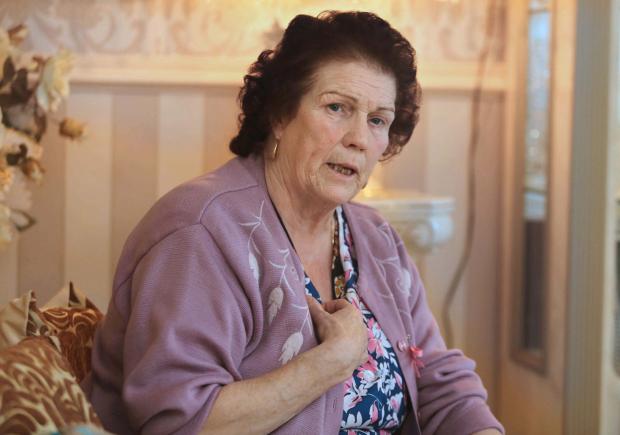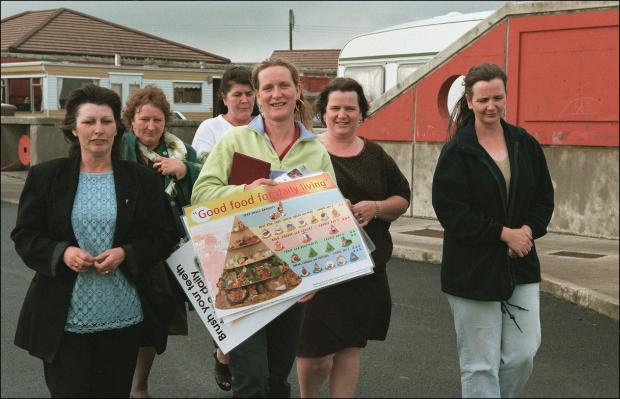A story of Travellers, advocacy, and health: Interview with Missy Collins
One of Pavee Point’s main areas of activity is challenging health inequalities faced by Travellers. The Primary Health Care Project is led by Travellers for Travellers. The project leaders listen to their community to assess their needs and work directly with health authorities to ensure that health policies consider travellers’ needs.
Missy Collins has been a key member of the Primary Health Care Project for more than 30 years. She told us why the Project is so important, the relevance of Travellers for Travellers being at the heart of advocacy, and the outcomes. She also shared some of her memories of Traveller life.

“If you’d told me 30 years ago, ‘well, Missy, you're going to be involved in Travellers’ health,’ I would have said, ‘nah.’ But I have to say, it was the empowerment and support we got from Pavee Point that made a difference.
“One of the aims of the Primary Health Care Project is that Travellers promote health services with Travellers. Travellers also talk to other Travellers about their needs, and take the information back to the health service providers.
“When we started the programme in 1992, a director from a government agency told me that Travellers going out talking to Travellers wouldn’t work because we can't read and write; we're not educated. Well, I said, I know my needs, and I know what will work, but I didn't win that day. I got up from that table, and as I was going away, I said, ‘I will be back; I'm not giving up’. A few months later, that same man agreed to a health service pilot project for nine months and then he became our boss for ten years.
“So, we did our own research questionnaire, and Travellers went to talk to Travellers. The best thing about that is Travellers aren’t afraid of talking to other Travellers like they would be if it had been a social worker asking the questions. There's always been a fear among Travellers that their children could be taken from them by social workers.
“At that time, we spoke to 85 families for the questionnaire and we took the answers back to Pavee Point and the healthcare providers. They ascertained that at that particular time there were three needs: a well-woman clinic, a hearing test for the children and a dentist set up in the evening, because Travellers were not using these services.
“Although we ourselves and our mummies before us had big families, we didn't know a lot about our own bodies. We didn't know what a smear test was. Some of the women didn't know what ovaries were. Some of the women were terrified when we told them they were going to have their breasts checked and a smear test. I remember one women who was afraid, but I convinced her to go in and, thank God, she did because her breast cancer was caught in time. It was work that made me very proud.
“The first time we went to the clinic with the children for their hearing test we brought 14 children, and 10 of them had to get treatment. If those children hadn't been helped, they probably would have ended up not hearing or not being able to speak properly.
“It was the same with the dentist. We set it up to meet Traveller needs. The whole family could go to the dentist, even in the evening, so she could check the whole family.
“I can say that we had success because we don’t need to do this anymore. Nearly all the families know where to go and what to do and they trust the healthcare providers. So, we've kind of broken down that barrier and now it's just as it should be. We're closing the gap.
“When I would meet with health ministers or people from the department of health, the first thing we lobbied for was a strategy for Travellers’ health, and one of the recommendations was for an All-Ireland Traveller Health Study. It took a long time, but it was finally published in 2010.
“I’ll never forget it. It was launched in Dublin Castle. I held it up over my head and said, ‘This is what I've been waiting for. This is what I wanted for every Traveller in Ireland.’ I thought it was the greatest thing in the world, and I was that proud. I was the proudest Traveller woman in Ireland.”
Memories of Traveller life
Good times and hard times
My mother had a big family; there was 12 of us. We didn't have a roof over our heads at that time. We were travelling around the country and had to camp at the side of the road. My grandfather would sell stuff out of a basket to the farmers’ houses. Our mummy wouldn’t have attended any hospital before the children were born. When they would be out in the country, far from the town, my mother would say to my father, ‘pull in near the next town’, but she wouldn't say, ‘I'm going to have a baby’. That was her old-fashioned way. And all the mothers at that time breastfed the child. They didn't have any powder milk, and they wouldn't have been able to get up during the night and heat it up because they'd have to light a fire. They had big plaid robes to wrap the baby up and [the mother] had to carry that child nearly all day. That was the way we lived, and that was how we managed. I remember all these things, and to me there were good times but there were hard times.
I thought there was no one like me
I was only eight years old when I made my first communion and nine for my confirmation. I didn't have any school. You would see the priest in the parish- one where you had become comfortable, because there was discrimination that time as well-and he’d arrange it for you and ask you to say a few prayers. Then you might go up to the school in the evening when the other children had gone home, so a master or a nun could teach a bit of catechism. I made my first communion with a dress that at least a hundred children might have used before me. The nuns lent it to me, and there were little white canvas shoes. I thought there was no one like me. I will never forget it. I went into one shop in the village and a woman gave me a whole banana ice cream, and I was delighted.
Pay no heed
We still face discrimination. It doesn’t matter how you dress or what you do, as soon as an Irish person sees me, they know I am a Traveller. If you go into a shop, they'll follow you around. I suppose most of the time we get that much discrimination against us that we’ll just leave and say, ‘pay no heed’. We used to say it years ago, as well. I always knew there was discrimination, but before I got involved with Pavee Point, I wouldn't have tried to do anything about it. When I got involved with Pavee Point in the early 90s, I got to realizing how much and how deep discrimination was with the Travellers. It used to be that you would go into the health clinic and the first person you would meet would look at you as if you didn't know how to read and write, which I didn't, and you would know from their manner that they were discriminating against you. So you'd come back home and say, ‘don't go down to that clinic because they don't want you.’
Feeling wanted or expected goes a long way

If you can't read or write, you go to a clinic or a hospital or anywhere, and you see everything written but you don't know what it says. A picture will capture a Traveller’s attention very quickly, and they will take more of an interest, especially if that image is related to Travellers, like a caravan or a wheel, or a photo of a Traveller person. If you see that displayed within a hospital setting or in a clinic then you feel that you're welcomed because there's a picture of us here in this building. So there's a part of feeling like you're wanted or you're expected, and that goes a long way.



